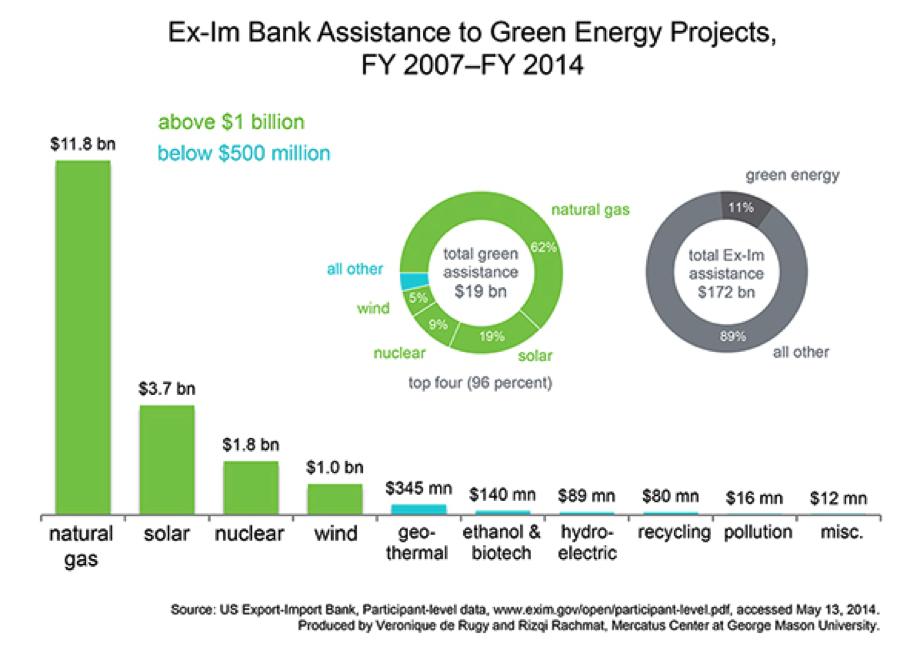A growing chorus of opposition is emerging against the U.S. Export-Import Bank. The bank’s authorization expires June 30, but while President Obama and his corporate cronies are lobbying for reauthorization, a coalition of organizations representing millions of Americans sent a letter to Congress calling for an end to Ex-Im, which “unfairly hurts domestic companies and risks billions of taxpayer dollars.”
The Ex-Im Bank is the official export credit agency of the U.S. government. The bank’s stated mission “is to ensure that U.S. companies—large and small—have access to the financing they need to turn export opportunities into sales.” While the bank claims it does not “compete with private institutions” but merely “fills gaps in the trade finance market,” Ex-Im has gained a reputation for favoring large, politically connected firms to the detriment of small businesses, the free market, and American families.
Ex-Im’s cronyism can be seen across the economy, particularly in the energy space. Over the last few years, the Obama administration has used Ex-Im to advance its costly green energy agenda, which has been marked by questionable dealings and spectacular failures. While Ex-Im props up costly renewables, it continues to restrict financing for affordable coal-fired power plants, which have the potential to lift millions of people in the developing world out of poverty.
The federal government should not be in the business of picking winners and losers, and it has a poor record of doing so. As explained below, the Ex-Im bank is no exception.
Green Energy Cronyism
The Ex-Im Bank has a congressional mandate to “increase support for environmentally beneficial U.S. exports, including…renewable sources of energy.” In 2009, Ex-Im “significantly increased its support for renewable-energy exports” to the tune of $257 million in FY 2013, $355.5 million in FY 2012, $721.4 million in FY 2011, $332 million in FY 2010, and $101 million in FY 2009. This “support” typically comes in the form of taxpayer-backed loan guarantees and other financing mechanisms.
As the Mercatus Center explains, these figures likely understate the true cost of Ex-Im’s green energy advocacy to taxpayers. (Mercatus points out that Ex-Im often misclassifies projects). The following chart shows that Ex-Im has doled out more than $19 billion for natural gas, solar, nuclear, and wind projects between FY2007 and FY2014. That represents 11 percent of Ex-Im’s total subsides.
The bank’s generous taxpayer “assistance” has resulted in a slew of questionable dealings and high-profile failures. Here are a few examples:
- Solyndra: Ex-Im approved a $10 million loan guarantee to a Belgian bank that financed the purchase of solar panels from Solyndra, a firm tied to the Obama administration that went bankrupt after leaving taxpayers on the hook for hundreds of millions of dollars.
- Exports In Name Only: Ex-Im approved subsidies for a company to sell solar panels to itself and call it an “export,” a Washington Examiner investigation revealed. The bank issued $455.7 million in loan guarantees for a Canadian company, St. Clair Solar, to buy solar panels from First Solar. The problem: First Solar owns St. Clair—so First Solar shipped solar panels to itself, taxpayers subsidized the sale, and Ex-Im called it an “export.”
- Double Dipping: As Mercatus points out, several large energy companies, some of which are foreign-owned, have received taxpayer subsidies from multiple federal programs in addition to handouts from Ex-Im. Examples include:
- Gamesa, a Spanish wind firm: $1.3 billion total (including Ex-Im).
- Areva, a French nuclear company: $2.1 billion.
- Abengoa, a solar and biofuel conglomerate: $3 billion.
Ex-Im Keeps Developing World in the Dark
While the Ex-Im Bank funnels taxpayer resources toward questionable green energy projects, it denies financing for affordable and reliable coal-fired power plants. In December 2013, Ex-Im announced that coal plants could no longer receive financing unless they installed carbon capture and storage technology.
This represents a de facto ban on coal. Carbon capture technology has proven an expensive flop for U.S. taxpayers. The technology does not exist at the commercial level in this country, despite years of subsidies worth hundreds of millions of dollars. There is just one utility-scale CCS plant in the world, a refurbished Canadian plant that cost $1.35 billion, which is three times as much as it would cost to build a similar-sized plant from scratch without CCS.
While IER opposes all energy subsidies, it is illogical to subsidize expensive renewable energy projects but restrict financing for affordable coal plants. More than 1.3 billion people around the world lack access to electricity, which is strongly correlated with increased life expectancy, education, and economic prosperity. Renewables simply cannot fulfill all the energy needs of the world’s energy poor. By restricting coal financing, Ex-Im is cutting off developing countries from one of the only energy sources that holds the potential to lift them out of darkness and poverty.
This double standard shows the blatant politicization of Ex-Im. President Obama wants to reauthorize the bank but maintain his coal restrictions. This demonstrates that the president has no interest in using Ex-Im to fund to the most economical projects, but rather to bankroll politically favored companies. Ex-Im’s political agenda squanders taxpayer resources that could be put to more productive use by the private sector—such as financing construction of coal-fired power plants in the developing world.
Conclusion
The Export-Import Bank’s authorization expires June 30. President Obama is lobbying Congress for reauthorization, but he has politicized Ex-Im beyond repair. The bank leaves taxpayers on the hook for billions of dollars to promote the president’s costly green energy agenda, which has resulted in shady dealings and high-profile flops. Meanwhile, the bank maintains its de facto ban on coal-fired power plants, denying a vital energy source to developing countries. Congress should let the Export-Import Bank expire.

